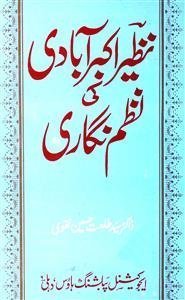Nazir Akbarabadi is admitted by many to be the Shakespeare of Urdu literature and indeed there is no exaggeration and hyperbole in it. Truly, a people’s poet, Nazir has been admired for many laurels to his credit. Amongst others, his humanism is distinct character of the greatness of this Mughal era luminary from Agra also called as Akbarabad. Nazir was born in Delhi and moved the capital of the Mughal Empire.
I am not going to delve into the philosophical dimensions of humanism in relation to the poetry of Nazir. I am only discussing one of his masterpieces dealing with the magnum opus of God and that is Admi, children of Adam, who are the most amazing creation of the Universe and like the universe in diversity, a man is a bundle of paradoxes.
What is human, what is humanism, the poem of Aadmi Nama penned by Nazir Miyan is so popular and moving that it has been a regular part of Indian text books of Hindustani language, Hindi and Urdu.
Here are some couplets from this poem:
| दुनिया में पादशह है सो है वो भी आदमी
और मुफ़्लिस-ओ-गदा है सो है वो भी आदमी ज़रदार-ए-बे-नवा है सो है वो भी आदमी नेमत जो खा रहा है सो है वो भी आदमी टुकड़े चबा रहा है सो है वो भी आदमी
|
دنیا میں پادشہ ہے سو ہے وہ بھی آدمی
اور مفلس و گدا ہے سو ہے وہ بھی آدمی زردار بے نوا ہے سو ہے وہ بھی آدمی نعمت جو کھا رہا ہے سو ہے وہ بھی آدمی ٹکڑے چبا رہا ہے سو ہے وہ بھی آدمی
|
The king in the world, the destitute and beggar, a man of wealth, a person living on delicious dishes and human being, who leads his life on dry loaves of bread, all these individuals belong to humane race. Here, Nazir wants to draw the attention to the fact that there may be stark contrast in wealth and power, but the beginning and end of entire human race is the same.
| अब्दाल, क़ुतुब ओ ग़ौस वली-आदमी हुए
मुंकिर भी आदमी हुए और कुफ़्र के भरे क्या क्या करिश्मे कश्फ़-ओ-करामात के लिए हत्ता कि अपने ज़ोहद-ओ-रियाज़त के ज़ोर से ख़ालिक़ से जा मिला है सो है वो भी आदमी
|
ابدال، قطب و غوث، ولی آدمی ہوئے
منکر بھی آدمی ہوئے اور کفر کے بھرے کیا کیا کرشمے کشف و کرامات کے لیے حتٰی کہ اپنے زہد و ریاضت کے زور سے خالق سے جا ملا ہے سو ہے وہ بھی آدمی
|
In this stanza, Nazir Akbarabadi alludes to the religious men and says as regards Abdal, Qutub, Gaus and Wali that all these religious men adhering to Islam, who endeavor in spiritual path and claim to have particular connection with the Almighty and those persons, who follow other religions, both these group of human being belong to the same species that is, Aadmi, progeny of Adam, the first man sent by heaven to the earth to manage its affaires.
| फ़िरऔन ने किया था जो दावा ख़ुदाई का
शद्दाद भी बहिश्त बना कर हुआ ख़ुदा नमरूद भी ख़ुदा ही कहाता था बरमला ये बात है समझने की आगे कहूँ मैं क्या याँ तक जो हो चुका है सो है वो भी आदमी
|
فرعون نے کیا تھا جو دعویٰ خدائی کا
شداد بھی بہشت بنا کر ہوا خدا نمرود بھی خدا ہی کہاتا تھا برملا یہ بات ہے سمجھنے کی آگے کہوں میں کیا یاں تک جو ہو چکا ہے سو ہے وہ بھی آدمی
|
Pharaoh had claimed to be the all almighty. Shaddad had created the paradise on earth. Namrood too equated himself to the creator of the universe. All these facts are true, however, in the end, all of these brute men were human being and they met with the same fate entire human race meets with. Nazir Miyan alludes here to the historical and religious character found in the revealed scriptures of Islam, Judaism and Christianity in particular.
The known English Romantic poet Percy Bysshe Shelley has written a sonnet namely Ozymandias focusing on the transience of human achievement and the fleeting nature of power and glory. It suggests that even the greatest man will eventually decline and fall, leaving only ruins and decay that also vanishes with the passage of time.
Shelley’s “Ozymandias” is a powerful example of how allusions can be used to convey complex ideas and themes in literature. The poem has become an iconic work of English literature and continues to be widely studied and admired today.
Aadminama is a long poem and can be accessed easily online, particularly on rekhta.org. Other books of Nazir Akbarabadi also are available on this extensive portal. Not only this poem but almost entire literary corps of this popular poet Nazir Akbarabadi is the witness to his humanism. (Hamid Siddiqui)







Leave a Reply